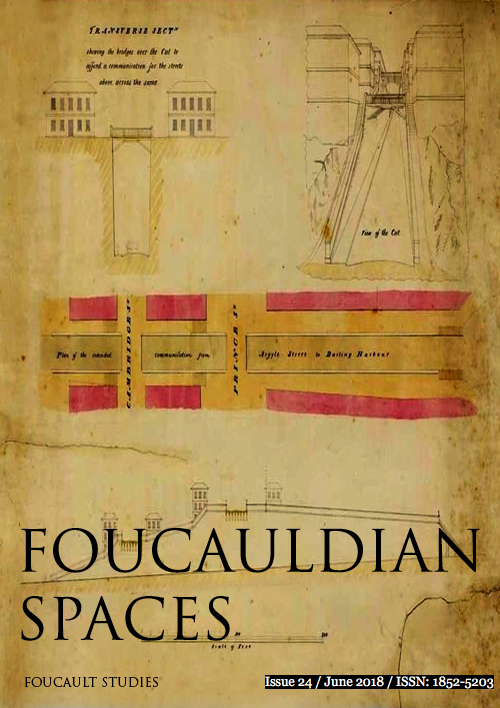From the End of Man to the Art of Life: Rereading Foucault’s Changing Aesthetics
DOI:
https://doi.org/10.22439/fs.v0i24.5529Keywords:
Foucault, Aesthetics, Life, Critique, The Avant-GardesAbstract
In Foucault’s writing throughout the 1960s, in which he foregrounds the critical function of language and signification, works of art and literature – and works of avant-garde art and literature in particular – appear prominently and are the objects of sustained theoretical investment. In the 1970s, however, as Foucault moves away from his earlier concern with language’s capacity to dissolve “man” and begins to concentrate instead on the ways in which man is governed, works of art and literature no longer possess the same political promise for him and drop out almost completely from his writing. Yet the question of aesthetics does not disappear for him entirely, and, in his final years, he returns to it, though with his analysis now directed at what he calls an “art” or “aesthetics of life.” In this paper, I examine these developments with the aim of drawing out the connections between Foucault’s changing view of aesthetics and the larger transformations that take shape within his overall project. Against this background, I argue that Foucault’s call for an art of life, in which the individual develops techniques for continually reinventing his or her existence, does not necessitate abandoning the avant-garde aesthetic practices that he had previously advocated. Rather, I assert, his conception of an art of life – when read in conjunction with his theorization of critique as a “permanent” questioning of the limits imposed on us – offers a new framework for reimagining both the function of those practices and their legacies in culture today.
References
• Charles Baudelaire, The Mirror of Art, ed. and trans. Jonathan Mayne (New York: Doubleday Anchor Books, 1956)
• David Carroll, Paraesthetics: Foucault, Lyotard, Derrida (New York and London: Methuen, 1987)
• Gary Shapiro, Archaeologies of Vision: Foucault and Nietzsche on Seeing and Saying (Chicago and London: The University of Chicago Press, 2003)
• Gilles Deleuze, Foucault, trans. Seán Hand (Minneapolis and London: University of Minnesota Press, 1988)
• Griselda Pollock, Vision and Difference (London and New York: Routledge, 1997)
• Hal Foster, The Return of the Real (Cambridge, Massachusetts and London, England: The MIT Press, 1996)
• James Faubion, “Introduction,” Aesthetics, Method, and Epistemology: Essential Works of Foucault 1954-1984 (New York, The New Press: 1998): https://doi.org/10.1017/CBO9780511629044.001
• Jean-Paul Sartre, “What is Literature?” and Other Essays (Cambridge, Massachusetts: Harvard University Press, 1988)
• John Rajchman, Michel Foucault: The Freedom of Philosophy (New York, Columbia University Press, 1985)
• Joseph J. Tanke, Foucault’s Philosophy of Art: A Genealogy of Modernity (London and New York: Continuum, 2009)
• Jürgen Habermas, “Modernity – An Incomplete Project,” The Anti-Aesthetic: Essays on Postmodern Culture, ed. Hal Foster (Seattle: Bay Press, 1983)
• Michel Foucault, Security, Territory, Population: Lectures at the Collège de France, 1977-78, ed. Michel Senellart, trans. Graham Burchell (New York: Picador, 2004)
• Michel Foucault, This Is Not a Pipe, ed. and trans. James Harkness (Berkeley, Los Angeles, and London: 1982)
• Michel Foucault, “Society Must Be Defended”: Lectures at the Collège de France, 1975-1976, ed. Mauro Bertani and Alessandra Fontant, trans. David Macey (New York: Picador, 1997)
• Michel Foucault, Aesthetics, Method, and Epistemology: Essential Works of Foucault 1954-1984, Vol. 2, ed. James D. Faubion (New York, The New Press: 1998)
• Michel Foucault, Death and the Labyrinth (London and New York: Continuum, 1986)
• Michel Foucault, Discipline and Punish: The Birth of the Prison, trans. Alan Sheridan (New York: Vintage Books, 1977)
• Michel Foucault, Ethics, Subjectivity and Truth: Essential Works of Foucault 1954-1984, Vol. 1, ed. Paul Rabinow (New York: The New Press, 1994)
• Michel Foucault, Power: Essential Works of Foucault 1954-1984, Vol. 3, ed. James D. Faubion (New York: The New Press, 1994)
• Michel Foucault, The Birth of Biopolitics: Lectures at the Collège de France, 1978-1979, ed. Michel Senellart, trans. Graham Burchell (New York: Picador, 2008)
• Michel Foucault, The History of Sexuality: An Introduction, trans. Robert Hurley (New York: Vintage Books, 1990)
• Michel Foucault, The Order of Things: An Archaeology of the Human Sciences (New York: Vintage Books, 1994)
• Michel Foucault, The Painter of Modern Life and Other Essays, ed. and trans. Jonathan Mayne (London: Phaidon Press Ltd., 1964)
• Michel Foucault, The Politics of Truth, ed. Sylvère Lotringer and Lysa Hochroth (New York: Semiotext(e), 1997)
• Michel Foucault, The Use of Pleasure, trans. Robert Hurley (New York: Vintage Books, 1990)
• Patrick Ffrench and Roland-François Lack, “Introduction,” The Tel Quel Reader, ed. Patrick Ffrench and Roland-François Lack (London and New York: Routledge, 1998)
• Peter Bürger, Theory of the Avant-Garde, trans. Michael Shaw (Minneapolis: University of Minnesota Press, 1984)
• Roland Barthes, Image – Music – Text, trans. Stephen Heath (New York: Hill and Wang, 1977)
Downloads
Published
How to Cite
Issue
Section
License
Authors retain copyright to their work, but assign the right of the first publication to Foucault Studies. The work is subject to a CC BY-NC-ND 4.0 license, but despite these restrictions, authors can take for granted that Foucault Studies will permit articles published in Foucault Studies to be translated or reprinted in another format such as a book providing a full reference is made to Foucault Studies as the original place of publication.



